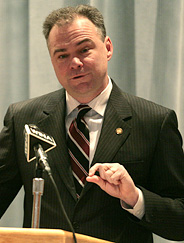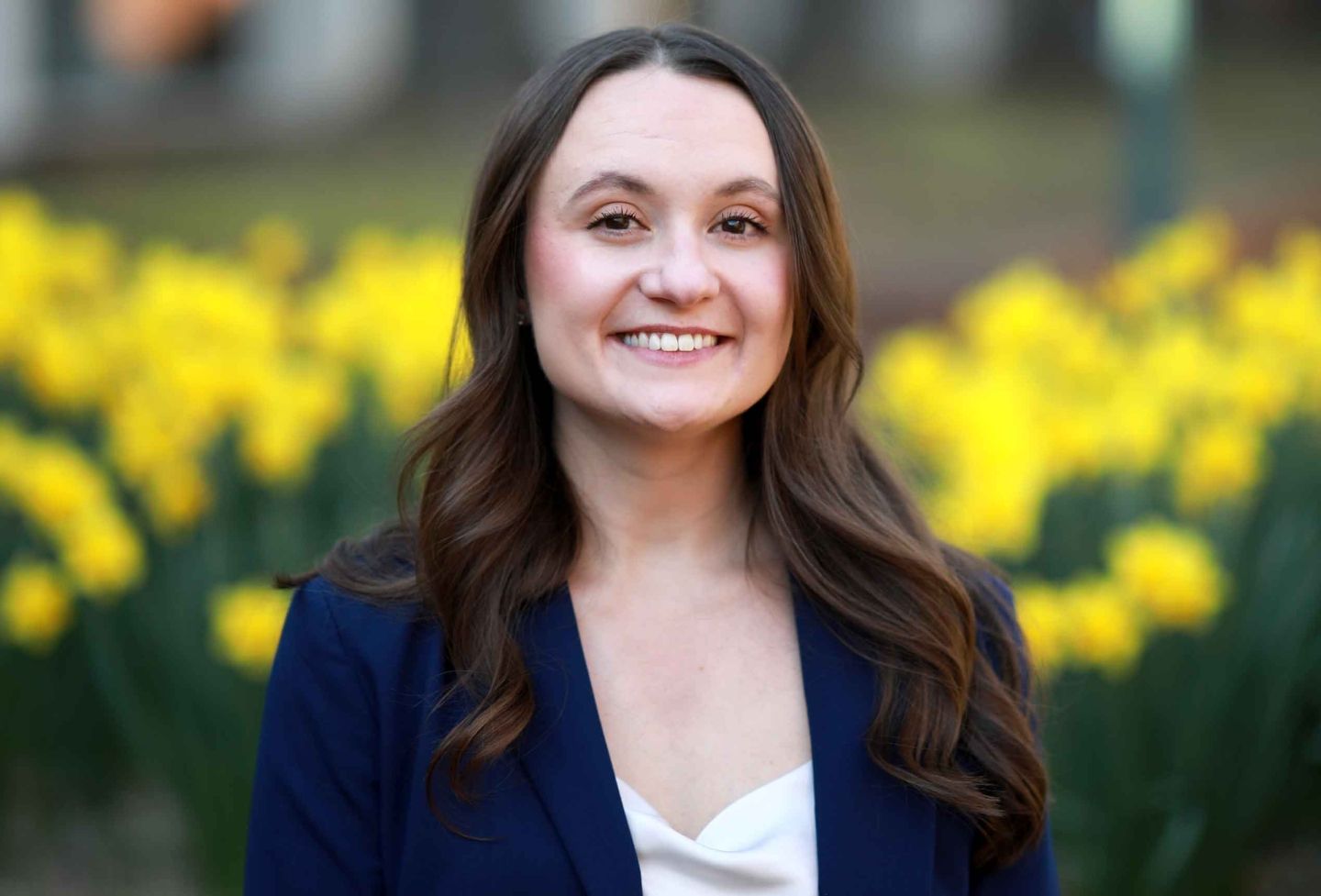Kaine Calls for Racial Reconciliation, Urges Students to Pursue Public Service
 Virginia Gov. Timothy Kaine offered law students guidance on how to pursue a career in public service during his keynote address at the eighth annual student-organized Conference on Public Service and the Law in Caplin Auditorium Saturday. Kaine encouraged students to consider becoming “bridge builders” across ethnic, racial, and national lines—a much-needed skill in the competition for a precious global commodity: talent.
Virginia Gov. Timothy Kaine offered law students guidance on how to pursue a career in public service during his keynote address at the eighth annual student-organized Conference on Public Service and the Law in Caplin Auditorium Saturday. Kaine encouraged students to consider becoming “bridge builders” across ethnic, racial, and national lines—a much-needed skill in the competition for a precious global commodity: talent.
Speaking as a lawyer who has spent 24 years in various public service roles, Kaine said he is constantly inspired by the “breadth of options” available in public service work and centered his talk on advising law students also interested in such work.
“There are so many ways to serve other people,” Kaine said. “With your law degree, you will never be short of an opportunity to do it on any day that you practice law.”
Kaine himself worked as a law clerk for a federal appellate judge; a private-sector lawyer, working in civil rights and making strides in fair-housing advocacy; a professor of legal ethics; a Richmond City Council member; mayor of Richmond; and lieutenant governor under former Gov. Mark Warner. His wife, Anne Holton, worked as a law clerk for a federal district judge; a legal aid lawyer; a juvenile court judge; and continues to advocate for children in foster care through initiatives in her role as first lady of Virginia.
Yet Kaine emphasized that these experiences do not even “scratch the surface” of public interest possibilities. To the students who wish to explore those possibilities, Kaine offered five points of advice on how to do so.
First, Kaine said, graduates should ask themselves, “What is the community I want to serve?” In other words, would-be public servants should narrow their search to a place—regardless of whether the determinant is a certain cause or interest group or simply a geographic factor.
Physically relocating opens a lawyer’s eyes to a host of service options, such as neighborhood and civic organizations and lesser-known law firms, that are not readily visible to someone who has no ties with that community.
Second, Kaine advised students to “be realistic about the salary you expect to make.” It is no secret that public interest lawyers earn significantly less than their peers working in other sectors of law. Kaine shared his experience of leaving his first law firm because it was not the most favorable environment for his inclination toward pro bono work. At the next firm, he was given the flexibility to do such work and the freedom to run for elective office—and two-thirds the salary of colleagues.
Yet he was happy. And with time, he learned that even public service lawyers can be financially comfortable.
“Get used to living on a little bit of money, and then you’ll have the freedom to do what you really want to do,” Kaine said. He added that he and Holton “focused on what it was we wanted to do and adjusted our lifestyle accordingly. That tradeoff is not one that we’ve ever questioned.”
Kaine’s third tip, for which he credited Holton, was to understand that people “lead serial lives.” No decision should be too stressful, he said, because everyone has the opportunity to do so many different things over the course of his or her life. He said students who feel pressure about finding the perfect position out of law school should think about this point in particular.
“Your career path will take you in twists and turns and to places you never thought you’d end up,” Kaine said. “But that’s a very positive thing.” Rather than envisioning the future in terms of a set of discrete goals, Kaine advised that students think of their careers as a series of opportunities.
Also, Kaine observed, it will always be the people, not the technical details of the work itself, that shape work experiences.
Moving onto “more substantive” material, Kaine highlighted in his fourth point the “need for racial reconciliation.”
Kaine called attention to Virginia’s 400-year anniversary: a celebration for some, he said, but a reminder of a painful history for others.
“I had to witness on the floor a very divisive and unusual debate among legislators about whether Virginia should officially express any sense of remorse or apology for slavery,” he recalled. “I can’t believe that it’s that hard. To say that Virginia regrets that, wishes it never happened, apologizes to those whose current lives are still affected by that legacy, seems straightforward.”
He expressed dismay that many bills introduced by Virginia legislators are “punitive towards new Americans” and concern that these bills “try to take advantage or exploit xenophobic feelings about people whose skin color is different, whose accents sound ‘funny,’ who speak a different language, or who wear apparel that is unusual.” He said he believes this attitude is still too apparent in political and social life.
Kaine suggested that audience members ask themselves, “Am I in any major part of my life in a minority?” If not, he recommends that people become deeply involved in a community or religious organization where they may feel some sort of outsider status and then “try to learn try to be a bridge builder, and try to be a reconciler.
“Not only is it the right thing to do, but our future depends on it,” Kaine said. “We’re in a global world right now… competing with regions and nations around the world. And the competition is for talent, the most precious commodity in the world. No commonwealth that sends a message that people aren’t welcome will win in the talent race.”
Finally, Kaine urged his audience to run for office.
He said both his democratic and republican colleagues agree that “it is increasingly difficult to find good people to run for public office.” Yet this is an arena where change clearly happens.
When Kaine drives by a school that was built thanks to him, when he sees a place in the community that has his “thumbprint” on it, he sees the value of his 13 years in public office.
“My political career will come to an end, and two or three years later, people will look at me and say, didn’t you used to do the weather or something?” Kaine said. “But when that day comes, I will still be able to be in my car and drive by a school that I had built, and I’ll remember.”
Lawyers are especially well-suited to public work, Kaine added. In addition to legal training, he believes they have the right disposition. Where others might get discouraged because their opinion is disputed, or their idea voted against, people with legal experience are able to move on and separate themselves personally from conflicts that could otherwise “erode relationships.”
Kaine recounted a life-changing story from his work with missionaries in Honduras during a year off from law school. After accepting a gift of food from an extremely poor family, the priest with whom Kaine was traveling said to him: “‘You’ve got to be really, really humble to take a gift of food from a family as poor as that.’”
Kaine has carried that morsel of wisdom with him throughout his entire career. He has since observed that every person is helped by another at every step—whether visibly or not—and that only those willing to accept assistance are the ones who will succeed. With every decision Kaine makes, therefore, he determines whether it will allow him to serve others or encourage others to serve.
“The most ennobling thing about being a human being is that we have something give,” he said.
Founded in 1819, the University of Virginia School of Law is the second-oldest continuously operating law school in the nation. Consistently ranked among the top law schools, Virginia is a world-renowned training ground for distinguished lawyers and public servants, instilling in them a commitment to leadership, integrity and community service.


